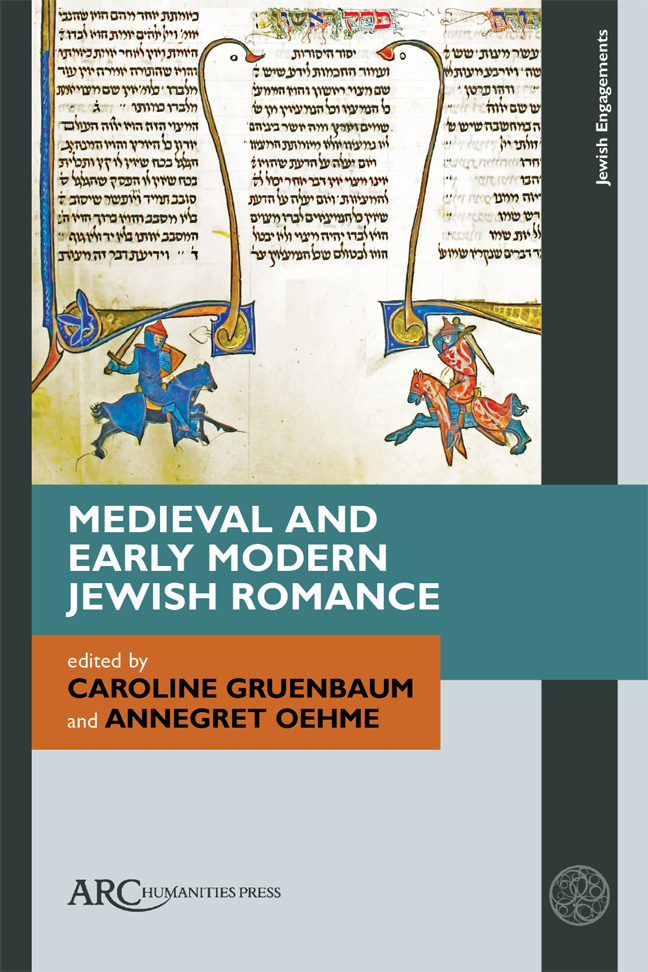Book contents
- Frontmatter
- Dedication
- Contents
- List of Illustrations
- Acknowledgements
- Introduction
- The Zohar as Medieval Jewish Romance
- Letters of Loathing: Immanuel of Rome and Romance Epistolary
- Illuminated Knights and Tales of Romance in the Rothschild Miscellany
- The Queen Nudatio: A Romanesque (?) Topos in Israel Caslari's Roman d’Esther
- At the Court of the Demon King: The Story of the Jerusalemite and Chivalric Romance
- Melekh Artus as a Jewish Romance: Horizons of Expectation and Genre Configurations
- A Friend in Need is a Friend Indeed?Friendship, Love, and Loyalty in the Yiddish Seven Sages of Rome
- Stealing Back One's Husband: The Yiddish Mayse mi-Danzek in the Context of Early Modern German Cross-Dressing Narratives
- Romance Elements in Meshal Haqadmoni by Isaac Ibn Sahula: A New Reading
- Afterword: Jewish Romance in Search of Identity
- Select Bibliography
- Index
Melekh Artus as a Jewish Romance: Horizons of Expectation and Genre Configurations
Published online by Cambridge University Press: 18 February 2024
- Frontmatter
- Dedication
- Contents
- List of Illustrations
- Acknowledgements
- Introduction
- The Zohar as Medieval Jewish Romance
- Letters of Loathing: Immanuel of Rome and Romance Epistolary
- Illuminated Knights and Tales of Romance in the Rothschild Miscellany
- The Queen Nudatio: A Romanesque (?) Topos in Israel Caslari's Roman d’Esther
- At the Court of the Demon King: The Story of the Jerusalemite and Chivalric Romance
- Melekh Artus as a Jewish Romance: Horizons of Expectation and Genre Configurations
- A Friend in Need is a Friend Indeed?Friendship, Love, and Loyalty in the Yiddish Seven Sages of Rome
- Stealing Back One's Husband: The Yiddish Mayse mi-Danzek in the Context of Early Modern German Cross-Dressing Narratives
- Romance Elements in Meshal Haqadmoni by Isaac Ibn Sahula: A New Reading
- Afterword: Jewish Romance in Search of Identity
- Select Bibliography
- Index
Summary
IN THE NEVER-COMPLETED romance Melekh Artus (“King Artus,” hereafter: MA) written in Hebrew and dated to 1279, the anonymous translator begins with a preface to the text, a work that Steinschneider, the great nineteenth-century German-Jewish scholar and bibliographer, considered to be “the greatest curiosity of Hebrew Literature.” The main story of MA consists of two illegitimate love affairs, both based on Arthurian sources: that of King Uther and Duchess Igerne, which results with Arthur's birth, and that of Lancelot and Guinevere, which would bring about King Arthur's death if the end of the romance existed. For Steinschneider, the preface of MA, in which the translator sets out the moral and religious value of the romance for his Jewish readers, reads as pure apologetics, arguing that the “bloody chivalry [in tournaments] and tales concerning figures involved in adultery, could find no advocates in Judaism.” It would appear that Steinschneider saw MA as the result of a personal conflict, rather than a manifestation of a cultural phenomenon of the period. Is this why the translator never finished his work, which we, or a medieval Jewish audience, perhaps were never intended to read?
The preface is in itself a significant part of the text, with much to teach us about the basic assumptions informing the translator's decision to create this translation and adaptation of tales from the non-Jewish Arthurian oeuvre for his intended Jewish readers, and about his goals in light of what he perceived to be his readers’ expectations. The possibility explored in this chapter is that both the preface and the rest of the MA are symptomatic of a wider literary and cultural phenomenon. Ongoing research over the past several decades has shown that Jewish readers in late medieval northern France and Italy were familiar with courtly romances and had a definitive interest in these works. Scholarship further points to elements within the Hebrew literature of the period that appears to be in dialogue with these types of texts. Thus, the internal contradiction so upsetting to Steinschnei-der, and which for him was so unconvincingly resolved, is the current study's motive for additional research. For the translator, this contradiction was also present. He espouses both negative and positive stances about the textual foundations underlying his text, without expressing a clear preference for either interpretation.
- Type
- Chapter
- Information
- Medieval and Early Modern Jewish Romance , pp. 107 - 128Publisher: Amsterdam University PressPrint publication year: 2023



